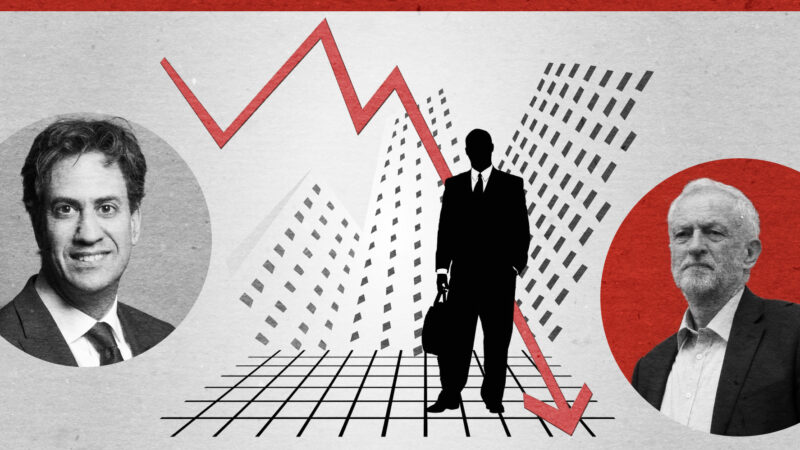
Labour’s last four general election defeats have all been rooted in its failure to understand the fallout from the 2008 financial crash and the beast that the crisis unleashed. The public reaction wasn’t simply to ‘swing left’ against casino capitalism. The crash was the catalyst for a decade-long backlash against an entire economy and culture built on cosmopolitan dominance. This backlash was on show both in the 2016 referendum and again in 2019’s ‘get Brexit done’ election.
Cosmopolitan Britain was underpinned by a dominant ideology that said globalisation and new technology would create a Britain replete with opportunity. This would benefit those “swift to adapt” and “slow to complain”, as Tony Blair famously stated in 2005. He presumably meant swift to move to London, because the reality was that wealth and opportunity were swept away from manufacturing and directed towards the financial services sector in the South East. The shift left industrial towns and communities to fend for themselves.
New technology devastated high streets and introduced low-paid and insecure ‘gig economy’ work. The economy was fed by a ‘winner-takes-all’ higher education system offering little for the forgotten 50% not attending university, and led by a ruling graduate class utterly content with the status quo. There were, of course, plenty of benefits of globalisation, but anyone willing a return to pre-2016 Britain should think again.
Why does all of this matter now? Simple: Covid-19 is likely to be a game-changer every bit as significant as the crash. How exactly the pieces will fall is unclear for now, but what is certain is that Labour will have to successfully read – and lead – that transformation far better than we did after the financial crisis. Ed Miliband’s Labour lost in 2015 because it resorted to a traditional state versus market argument. The promise of the unifying, post-Olympic ‘One Nation Labour’ agenda was jettisoned – along with ‘responsible capitalism’ – for a more traditional state-based leftism, with the traditional electoral result. The 2016 EU referendum result then marked a backlash that had been brewing for years – one that most in Labour just couldn’t understand and blamed on xenophobia.
Labour must read the next decade far better than it did the last, starting with the coronavirus fallout. Taxpayers may swing left and be more willing to fund health and social care. But they may also want those taxes to replenish the treasury’s coffers. And even if the country does move left on spending, it doesn’t mean voters will automatically swing behind Labour. The Conservative Party is the ultimate wolf in sheep’s clothing, putting pragmatism over ideology at every turn. Despite wasting a nine-week head start at the beginning of this crisis, they are flying in the polls and will do whatever it takes to maintain that lead.
The other assumption is that the Covid-19 crisis will increase demand for international co-operation to fight global challenges. This argument should defeat the nationalist view that the UK can somehow hide away in self-isolation, but Labour will still need to beat that drum effectively. What we must not do is mistakenly assume that embracing international co-operation means returning to the cosmopolitan ideology of unfettered globalisation. This is dangerous because the dominant cultural trend we are seeing is a recognition that localism, neighbourliness and solidarity matters more than anything. The public are recognising more than ever the importance of family and community. Localism and communitarianism are more deeply etched into the nation’s psyche than globalism and cosmopolitanism.
Labour needs to adapt to this situation. Some on the left are terrified to talk about family because they worry it has to mean two straight parents, and fear that ‘community’ is somehow a buzzword for the white working classes. Their aversion is ridiculous, because modern families and communities come in all shapes, sizes and colours. The new Labour leader must show leadership and wrap our part in the language of communitarianism. But that alone will not be enough.
Regaining the public’s ear will first require a reckoning about what has gone wrong. We need to face two important realities. First, just how irrelevant Jeremy Corbyn and Corbynism has made our party. Second, how much trust has been lost over Brexit. Most Labour members seem to have come to understand the first, but will the new leadership really have the confidence to face up to the second? Polling suggests that 73% of Labour-to-Tory switchers in 2019 cited Labour’s Brexit position as a reason to throw their weight behind Boris Johnson’s ‘get Brexit done’ message.
The coronavirus crisis may help us overcome the Remain-Leave divide, but the underlying mistrust felt by many Leavers who saw us renege on our promise to respect the referendum will run far deeper. We have to think carefully about how we regain the trust of these voters and reconnect with their priorities. For instance, if Labour fails to take a constructive position on both the UK’s trade talks and the new Tory immigration policy, then we can kiss the Bolsover and the Blyth Valley seats goodbye for a generation.
The new leader’s critique of the government’s handling of the Covid-19 crisis also needs deep thought. Praising the economic response but highlighting the health failures and the wasted nine-week head start feel like the credible and principled route to take, when the moment is right. Restoring credibility, regaining trust, and reading the post-coronavirus landscape correctly – this is the bare minimum that our new leader must do to avoid repeating the mistakes of the last decade.




More from LabourList
Government abandons plans to delay 30 local elections in England
‘The cost of living crisis is still Britain’s defining political challenge’
‘Nurses are finally getting the recognition they deserve’